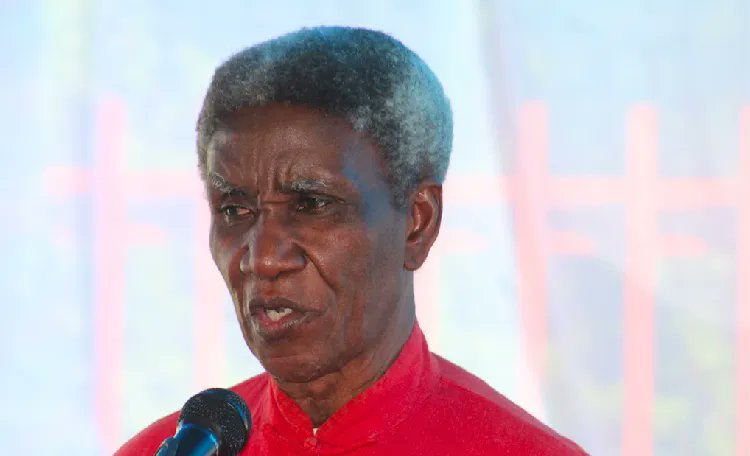Ben Amathila stands as one of Namibia’s most influential and revered political figures, celebrated for his unwavering commitment to the country’s independence and equality. As a dedicated freedom fighter, statesman, and advocate for the rights of all Namibians, Amathila played an instrumental role in shaping the trajectory of Namibia’s path to independence and its post-independence governance. His leadership, vision, and selflessness made him a key player in the fight for Namibia’s freedom and in the establishment of a more equitable society.
Early Life and Education of Ben Amathila
Born in 1938 in the village of Okadiva in the southern region of Namibia, Ben Amathila was raised during a time when the country was under the harsh rule of colonialism. His early life, however, ignited a passion for social justice and equality. Growing up under apartheid-era South Africa’s rule, Amathila experienced firsthand the injustices and inequalities that plagued the majority of Namibians, particularly the Black population. This fueled his desire for change, driving him to seek both knowledge and a platform to challenge the oppressive systems in place.
Amathila attended various educational institutions during his youth, where he focused on acquiring the skills and knowledge necessary to contribute to Namibia’s liberation. His education helped shape his later political and advocacy work, giving him a foundation that would allow him to address the injustices that Namibians faced under the apartheid regime.
Ben Amathila’s Political Journey and Role in Namibia’s Independence
Ben Amathila’s political journey began in the 1960s, a period during which Namibia was still under South African administration, and the people of Namibia were denied basic civil rights. Amathila became involved with the South West Africa People’s Organization (SWAPO), the liberation movement that would eventually lead Namibia to independence. He was deeply committed to the ideals of freedom, self-determination, and equality, and his participation in SWAPO marked the beginning of a lifelong fight for the country’s independence.
Amathila’s involvement with SWAPO was crucial in galvanizing resistance against South African apartheid and colonial rule. As a prominent member of the organization, he worked tirelessly to mobilize Namibians both within the country and abroad to rally for independence. Amathila’s role extended to organizing political campaigns, speaking at rallies, and advocating for global support in pressuring the apartheid regime to end its occupation of Namibia.
One of Amathila’s key contributions to Namibia’s liberation movement was his advocacy for the recognition of Namibia’s right to self-determination on the international stage. His diplomatic efforts helped garner support for SWAPO from the United Nations and other international bodies. By engaging with global leaders and raising awareness about the struggles of Namibians, Amathila played an essential role in securing the political backing that would eventually lead to Namibia’s independence in 1990.
The Fight for Equality and Social Justice
Throughout his political career, Ben Amathila remained steadfast in his belief that Namibia’s independence could only be meaningful if it was accompanied by true equality for all of its citizens. He believed that liberation must be followed by policies that uplifted the marginalized and historically oppressed communities, especially the Black majority.
Amathila was a vocal advocate for social justice throughout his time in politics. In particular, he focused on the rights of workers, the improvement of educational opportunities for marginalized groups, and the protection of women’s rights. His commitment to social equality led him to pursue policies that addressed the deep racial and socio-economic divides that had been entrenched during colonial rule.
His advocacy was not limited to just rhetoric; it translated into tangible efforts aimed at empowering Namibia’s underprivileged. He pushed for land reform policies, aimed at giving Namibians access to land that had been unjustly taken during the colonial period. Furthermore, he advocated for greater investments in education, healthcare, and infrastructure in rural areas, which had long been neglected under the apartheid system.
Leadership in Namibia’s Government Post-Independence
After Namibia’s independence in 1990, Ben Amathila continued to serve his country as a member of the newly formed government. His role within the government reflected his enduring commitment to the welfare of the Namibian people. Amathila was appointed as the Deputy Prime Minister of Namibia, where he continued to advocate for policies aimed at achieving the goals of social justice and economic equality.
As a government leader, Amathila played a crucial role in formulating policies that would ensure Namibia’s newfound independence would lead to substantial and lasting improvements for its citizens. Under his leadership, key reforms were implemented in areas such as land redistribution, social welfare programs, and the expansion of healthcare and education.
One of the hallmarks of Amathila’s leadership was his emphasis on unity and reconciliation. Understanding the divisions that had been sown during decades of colonial and apartheid rule, Amathila worked to bring together different ethnic groups and political factions to work toward a shared vision for the future of Namibia. His efforts were crucial in ensuring that Namibia’s transition from colonial rule to independence was as peaceful and inclusive as possible.
Ben Amathila’s Legacy and Contributions to Namibian Society
Ben Amathila’s legacy is one of tireless dedication to the cause of freedom, justice, and equality. His contributions to Namibia’s independence movement and his post-independence leadership laid the groundwork for the democratic, multi-ethnic society that Namibia is today.
His legacy lives on in the policies and institutions he helped shape, many of which continue to benefit Namibians across the country. In particular, his commitment to social justice can be seen in Namibia’s ongoing efforts to promote land reform, improve educational access, and provide better healthcare and social services for disadvantaged communities.
Moreover, Ben Amathila’s legacy is marked by his role as an inspirational leader who demonstrated the importance of unity in the face of adversity. His vision for a united, independent Namibia, free from oppression and inequality, continues to inspire future generations of Namibian leaders, activists, and citizens.
Ben Amathila is a giant in Namibia’s political history, having played an essential role in the country’s fight for independence and equality. From his early involvement in the SWAPO liberation movement to his post-independence work as a government leader, Amathila’s contributions have had a lasting impact on Namibia’s social, political, and economic landscape. His unwavering commitment to the principles of freedom, equality, and justice serves as a beacon for Namibia’s future, and his legacy will undoubtedly continue to inspire future generations of Namibians for years to come.
In honoring Ben Amathila’s remarkable life, Namibia acknowledges the vital role he played in shaping the country’s journey from oppression to freedom. His efforts remain integral to the nation’s ongoing pursuit of a just and equitable society for all of its citizens.
Join 'Namibia Today' WhatsApp Channel
Get the breaking news in Namibia — direct to your WhatsApp.
CLICK HERE TO JOIN












